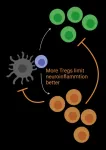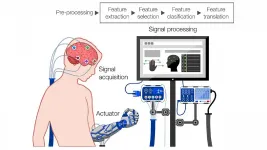(Press-News.org) New research adds to a body of evidence indicating decisions about withdrawing life-sustaining treatment for patients with moderate-to-severe traumatic brain injury (TBI) should not be made in the early days following injury.
In a July 6, 2021, study published in JAMA Neurology, researchers led by UC San Francisco, Medical College of Wisconsin and Spaulding Rehabilitation Hospital followed 484 patients with moderate-to-severe TBI. They found that among the patients in a vegetative state, 1 in 4 "regained orientation" - meaning they knew who they were, their location and the date - within 12 months of their injury.
"Withdrawal of life-sustaining treatment based on early prediction of poor outcome accounts for most deaths in patients hospitalized with severe TBI," said senior author Geoffrey Manley, MD, PhD, professor and vice chair of neurological surgery at UCSF and chief of neurosurgery at Zuckerberg San Francisco General Hospital, noting that 64 of the 92 fatalities in the study occurred within two weeks of injury.
"TBI is a life-changing event that can produce significant, lasting disability, and there are cases when it is very clear early on that a patient will not recover," he said. "But results from this study show a significant proportion of our participants experienced major improvements in life functioning, with many regaining independence between two weeks and 12 months after injury."
The patients in the study were enrolled by the brain injury research initiative TRACK-TBI, of which Manley is the principal investigator. All patients were 17 and older and had presented to hospitals with level 1 trauma centers within 24 hours of injury. Their exams met criteria for either moderate TBI (approximately one third of patients) or severe TBI.
In both groups, the most common causes of injury were falls, assault and primarily car and motorcycle crashes in which the patient had been a driver/passenger, pedestrian or cyclist.
The patients, whose average ages were 35 in the severe TBI group (78 percent males) and 38 in the moderate TBI group (80 percent males), were assessed using the Glasgow Outcomes Scale Extended (GOSE), which ranges from 1 for death to 8 for "upper good recovery" and resumption of normal life. The Disability Rating Scale (DRS) was also used to categorize impairment.
At 12 Months, Small but Significant Minority of Severe TBI Patients Had No Disability
At two weeks post-injury, 93 percent of the severe TBI group and 79 percent of the moderate TBI group had moderate-to-severe disability, according to the DRS, and 80 percent had GOSE scores from 2 to 3, meaning they required assistance in basic everyday functioning.
But by 12 months, half of the severe TBI group and three-quarters of the moderate TBI group had GOSE scores of at least 4, indicating they could function independently at home for at least eight hours per day. Moreover, 19 percent of the severe TBI group had no disability, according to the DRS, and a further 14 percent had only mild injury, the researchers noted.
Most surprising were the findings for the 62 surviving patients who had been in a vegetative state, defined as a chronic state of brain dysfunction in which a person shows no signs of awareness. All patients had recovered consciousness by the 12-month mark and 14 out of the 56 with available data (1 in 4) had regained orientation. All but one survivor in this group recovered at least basic communication ability.
"These patients made the cut for favorable outcome," said co-first author, Joseph Giacino, PhD, of Spaulding Rehabilitation Hospital, Massachusetts General Hospital and Harvard Medical School. "Their GOSE scores were 4 or higher, which meant they could be at home unsupervised for at least eight hours a day, since they were able to take care of basic needs, such as eating and toileting."
The study follows previous research that shows a significant percentage of patients with grave impairments achieve favorable functionality many months or years later. This research, led by Giacino, coincided with the recommendation in 2018 from the American Academy of Neurology that in the first 28 days after injury, clinicians should refrain from telling families that a patient's prognosis is beyond hope.
"While a substantial proportion of patients die or suffer lasting disability, our study adds to growing evidence that severe acute impairment does not portend uniformly poor long-term outcome," said Manley, who is also affiliated with the UCSF Weill Institute for Neurosciences. "Even those patients in a vegetative state - an outcome viewed as dire - may improve, since this is a dynamic condition that evolves over the first year."
INFORMATION:
Co-first author is Michael McCrea, PhD, of Medical College of Wisconsin. A full list of authors and TRACK-TBI investigators is available in the journal.
The study was supported by grants from the U.S. National Institutes of Health, National Institute of Neurologic Disorders and Stroke, U.S. Department of Defense, TBI Endpoints Development (TED) Initiative.
About UCSF: The University of California, San Francisco (UCSF) is exclusively focused on the health sciences and is dedicated to promoting health worldwide through advanced biomedical research, graduate-level education in the life sciences and health professions, and excellence in patient care. UCSF Health, which serves as UCSF's primary academic medical center, includes top-ranked specialty hospitals and other clinical programs, and has affiliations throughout the Bay Area. UCSF School of Medicine also has a regional campus in Fresno. Learn more at ucsf.edu, or see our Fact Sheet.
By Luciana Constantino | Agência FAPESP – A pregnant woman infected by zika virus does not face a greater risk of giving birth to a baby with microcephaly if she has previously been exposed to dengue virus, according to a Brazilian study that compared data for pregnant women in Rio de Janeiro and Manaus.
A zika epidemic broke out in Brazil in 2015-16 in areas where dengue is endemic. Both viruses are transmitted by the mosquito Aedes aegypti. Some of the states affected by the zika epidemic reported a rise in cases of microcephaly, a rare neurological disorder in which the baby’s brain fails to develop completely. Others saw no such rise.
According to this new study by Brazilian researchers, two factors explain the rise in microcephaly in only some areas: the ...
When it comes to improving access to mental health services for children and families in low-income communities, a University of Houston researcher found having a warm handoff, which is a transfer of care between a primary care physician and mental health provider, will help build trust with the patient and lead to successful outcomes.
"Underserved populations face certain obstacles such as shortage of providers, family beliefs that cause stigma around mental health care, language barriers, lack of transportation and lack of insurance. A warm handoff, someone who serves as a go-between for experts and patients, can ensure connections are made," said Quenette L. Walton, assistant professor at the ...
Irvine, CA - July 20, 2021 - In a new University of California, Irvine-led study, researchers found that a certain protein prevented regulatory T cells (Tregs) from effectively doing their job in controlling the damaging effects of inflammation in a model of multiple sclerosis (MS), a devastating autoimmune disease of the nervous system.
Published this month in Science Advances, the new study illuminates the important role of Piezo1, a specialized protein called an ion channel, in immunity and T cell function related to autoimmune neuroinflammatory disorders.
"We found that Piezo1 selectively restrains Treg cells, limiting their potential to mitigate ...
Newborns at risk for Type 1 diabetes because they were given antibiotics may have their gut microorganisms restored with a maternal fecal transplant, according to a Rutgers study.
The study, which involved genetic analysis of mice, appears in the journal Cell Host & Microbe.
The findings suggest that newborns at risk for Type 1 diabetes because their microbiome - the trillions of beneficial microorganisms in and on our bodies - were disturbed can have the condition reversed by transplanting fecal microbiota from their mother into their gastrointestinal tract after the antibiotic course has been completed.
Type 1 diabetes is the most ...
WASHINGTON, July 20, 2021 -- In the wind power industry, optimization of yaw, the alignment of a wind turbine's angle relative to the horizonal plane, has long shown promise for mitigating wake effects that cause a downstream turbine to produce less power than its upstream partner. However, a critical missing puzzle piece in the application of this knowledge has recently been added -- how to automate the identification of which turbines are experiencing wake effects amid changing wind conditions.
In the Journal of Renewable and Sustainable Energy, by AIP Publishing, ...
WASHINGTON, July 20, 2021 -- Surpassing the biological limitations of the brain and using one's mind to interact with and control external electronic devices may sound like the distant cyborg future, but it could come sooner than we think.
Researchers from Imperial College London conducted a review of modern commercial brain-computer interface (BCI) devices, and they discuss the primary technological limitations and humanitarian concerns of these devices in APL Bioengineering, from AIP Publishing.
The most promising method to achieve real-world BCI applications is through electroencephalography (EEG), a method ...
Millions of people in countries around the world could face an increased risk of malnutrition as climate change threatens their local fisheries.
New projections examining more than 800 fish species in more than 157 countries have revealed how two major, and growing, pressures - climate change and over-fishing - could impact the availability of vital micronutrients from our oceans.
As well as omega-3 fatty acids, fish are an important source of iron, zinc, calcium, and vitamin A. A lack of these vital micronutrients is linked to conditions such as maternal mortality, stunted growth, and pre-eclampsia.
Analyses by an international team from the UK and Canada and led by scientists from Lancaster ...
PHILADELPHIA -- (July 20, 2021) -- Alternative polyadenylation (APA) is an RNA processing mechanism that regulates gene expression by generating different ends on RNA transcripts of the same gene. Though it affects more than half of human genes, the significance of APA was poorly understood. Now a new study by The Wistar Institute describes an important function of APA in allowing certain mRNAs to reach specific sites of protein synthesis and reveals that length, sequence and structural properties can determine the destination (and fate) of mRNAs within the cell. These findings, published online in the journal Cell Reports, shed light on the consequences of APA that may represent a paradigm shift in the mRNA metabolism field.
The ...
What The Study Did: Credit reports were analyzed to estimate the amount of medical debt in collections nationally and by geographic region and income group and its association with Medicaid expansion under the Affordable Care Act.
Authors: Neale Mahoney, Ph.D., of Stanford University in Stanford, California, is the corresponding author.
To access the embargoed study: Visit our For The Media website at this link https://media.jamanetwork.com/
(doi:10.1001/jama.2021.8694)
Editor's Note: The article includes funding/support disclosures. Please see the article for additional ...
New Rochelle, NY, July 19, 2021--Duct tape and items retrieved from the water are common pieces of evidence in forensic cases. A new study evaluates the recovery of DNA from folded duct tape that has been submerged in ocean water for up to 2 weeks. The study is published in the peer-reviewed journal Forensic Genomics. Click here to read the article now.
Joseph Donfack, PhD, from the Federal Bureau of Investigation (FBI) Laboratory Division, and coauthors showed that it is possible to recover enough DNA to yield a complete short tandem repeat (STR) profile from folded duct tape that has been submerged in ocean water for up to 2 weeks if the initial ...







